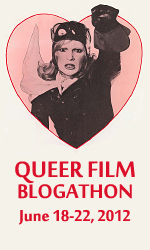 This is my entry for the Queer Film Blogathon, hosted by Garbo Laughs. Please check out Caroline’s entries as well as all the other fine participants!
This is my entry for the Queer Film Blogathon, hosted by Garbo Laughs. Please check out Caroline’s entries as well as all the other fine participants!
***
Hollywood loves to engage in bigotry through the guise of humor, usually qualified as “edgy” or “irreverent.” When bigotry is played as humor, it automatically inherits the default “it’s just a joke” deflection, essentially excusing its controversial content simply because of context; that is why a homophobic character used purely for humor and without any reflection of social commentary is so problematic.
The 1970s version of the foul-mouthed cop slinging racist and homophobic epithets seems to be a common spin of the popular Archie Bunker type of character, but without any acknowledgement that Bunker was social satire — at least until he inadvertently became the voice of the disaffected and scared middle class (see season two’s Jesus Christ Superstar rant in “Archie and the Lock-Up”). Stripping these slur-slinging characters of satire was more than just lazy, it was a deliberate effort to reassert the dominance of white males in an era where that dominance was being questioned.
The buddy-cop film Freebie and the Bean pairs two bumbling, high-spirited police detectives, one of whom takes bribes and engages in all manner of bigoted slurs against pretty much everyone who isn’t male and white. He is also portrayed as a desirable, suave, well-dressed, handsome guy.
FatB opens with the partners Freebie and Bean rifling through a guy’s trash. They are so obvious about it, loudly grabbing the can and dumping everything into their trunk before the guy even goes back into the house, that you know immediately that these are not exactly San Francisco’s finest. Three minutes into the film, Freebie starts throwing the slur “fag” around. Four minutes in, Valerie Harper is credited as “Bean’s wife,” no one on staff feeling the need to give the lead female role a name. Five minutes into the film, the titular heroes pass by a group of extras on the street, all black men dressed in outsized pimp duds, overdubbed with Amos and Andy voices and so agitated they are literally waving their arms around. Like clockwork, at six minutes into the film, Freebie calls his Mexican-American partner “beaner;” and now you know why Alan Arkin’s character is called “The Bean.”
See? It’s funny already!
Alan Arkin is one of my favorite actors, but he sadly spent much of his acting life in the 1960s and 70s as the go-to “ethnic” guy; Freebie, released in 1974, was at least his second brownface role. Though Freebie (James Caan) is clearly the wilder of the two detectives, both manage to violate civil rights, destroy property, and attract the ire of those in the police force who actually know what the hell they’re doing. Alex Rocco has a terrific part as the DA, a man who is equal parts bewildered and angry at the duo’s incompetence.
As they try to take down the bad guys, Bean is distracted because his wife Valerie Harper may be having an affair. Bean’s Wife has no name of her own in the credits, is played by an actress in brownface, and hits all the stereotypical notes of being the hot-tempered, fiery Latina, even cussing at him in Spanish, though the most unconvincing Spanish you’ve ever heard on the big screen. Paul Muni’s accent in Bordertown (1934) was more convincing, that’s just how bad it is.
Freebie and the Bean, most of all, is about car crashes, and that’s what a majority of reviewers love about the flick. Even though the editing slows down the action, the cinematography is haphazard, and the stunts obvious; the cars are regularly off their mark and are seen sharply correcting to hit their designated targets, which turns even large car wrecks into something pretty stale.
Beyond the casual sexism and racism for humor is the film’s treatment of one of the villains, a transvestite played by noted female impersonator Christopher Morley. We first meet his character in a tub, over-sexed and lisping, Freebie and Bean both disgusted by his mere existence.
As the pair follow one of big players in the criminal scheme they’re trying to take down, they screw up yet again and let him drive away with a lady he met in a park. The lady, of course, turns out to be someone Bean and Freebie should have been protecting him from.
But that’s no lady, that’s Christopher Morley’s character in disguise.
Edited to add: Throughout this post I use the term “transvestite” for Morley’s character. This is somewhat problematic, as the term transvestite is outdated and derogatory. When writing this, I had qualms about using the term, but I felt stymied by the film’s lack of detail about the character. The man is gay, the first scene where he appears makes that clear, but we see nothing to indicate if he is expressing his gender identity, or if he is a cross-dresser or female impersonator, or just wearing a dress as a disguise with the stereotyped implication that all gay men know how to dress as women.
Freebie obviously uses the 1970s-era definition of “gay” where all gay men dress like women at times, and that I think is what “transvestite” meant to the mainstream, unfamiliar audience of the time. I honestly do not know of another word besides “transvestite” that conveys that weird, inaccurate 1970s definition, which is why I used the term. Also, I wanted to use the term to highlight just how one-dimensional and inaccurate the film was in its portrayal.
The film engages in transphobia as much as it engages in homophobia, but while transphobia is invoked here, it doesn’t mean the character is transgender. I didn’t want to claim Morley’s character to be transgender if he wasn’t, and I wasn’t sure he was. On the other hand, “transvestite” is derogatory, and some explanation should have been made as to why I used the term. My apologies for not being clearer on this. I have edited the post (as of 7:30 p.m. Central, June 22) to hopefully correct this. And now, back to the film…
After a lengthy chase, the “transvestite” villain shoots Bean, seriously injuring him, and Freebie faces him in a final showdown in a bathroom at the baseball stadium. Freebie is beaten at first, knocked on the ground by the “transvestite” who interrupts his kicks and punches for a little preening time, but eventually Freebie manages to grab a gun and empties it into the transvestite’s chest.
Audiences reportedly cheered at the death scene, not just happy for the villain’s demise but cheering “the death of the fag.” Notably, the shooting was deemed too violent for network reruns of the film, who removed several of the gunshots to reduce it down to just two.
What Freebie and the Bean does better than almost any other film I’ve encountered is expose the somewhat seedy underbelly of film appreciation, the rarely talked-about issue of people who watch older films specifically because they enjoy the way minorities, women, and gays were treated. This comes out in the casual reviews of Freebie, where commenters wear their “non-PC” bona fides like a badge. “Long before the PC crowd raised their ugly heads,” starts one IMDb review; people who disliked the racism and sexism are labeled “uptight” and “chuckleheads” who only want movies made “under a watchdog’s microscope” in other reviews. The movie “is so un-PC,” praises Cashiers du Cinemart, “it releases you from the idiotic grip of acting prim and proper.” Dennis of Sergio Leone and the Infield Fly Rule proclaims Freebie and the Bean was made when racism, sexism and homophobia “didn’t much concern either the intelligentsia or the great unwashed,” which I suspect will be a bit of a surprise to those who were working on the front lines of feminism, civil rights, and gay rights in 1974. A comment on Dennis’ review is notable for stating “the tranny” character was treated no more poorly in the film than “any other film of the time” would have done.
That’s just one variation of “this was acceptable back then” canard that is repeated with unsurprising frequency in reviews of FatB. Many who say this then go on to praise the humor as being funniest of its kind, without any understanding that they find the humor acceptable today. They are literally watching films like Freebie and the Bean to indulge in humor they acknowledge as unacceptable nowadays.
And I think if you read through online comments about Freebie and the Bean you’ll see the defiant better-than-you attitude of those who deny homophobia and transphobia in this film. (Frankly, you will see much the same talk about Golden Age Hollywood films on most blogs and discussion forums as well.) Fans of Freebie know better than to fall for “today’s ridiculous P.C. concerns”. They have no problem with Freebie calling his partner a “beaner,” and they think it’s funny to see a gay man prance around in a bathroom. They’re hardcore. They’re the true thinkers, and their belief that things were “just that way” in previous decades becomes “I know more about cinematic history than you do, stupid” in their hands. They’re the real film buffs because they care about the film, not like wimpy PC types who care too much about other people’s feelings.
In this way, the “it was just that way back then” rant about older films has become as effective as the “you can’t take a joke” deflection in excusing unexamined bigotry.
Another notable deflection used specifically to dismiss the homophobia in FatB is that, hey, the gay character almost kills both Freebie and Bean. That means he’s tough, implying, I suppose, that he is unlike the usual sissyboys that gay men are. Dennis of SLatIFR notes Paul Matwychuk could not decide, in his review of FatB, whether the film was homophobic or not because the gay man “nearly beats up Caan without thinking twice — and in high heels to boot.” Technicolor Dreams claims the homophobia is “offset” by “the transvestite’s” physical prowess.
I submit to you that it is impossible to more blatantly equate homosexuality, cross-dressing and transgender with weakness than that.
The character, however — credited as “transvestite;” the man doesn’t even get a name and he’s the fucking big bad evildoer taken down in the big fight at the end of the film, for god’s sake — is not presented as a badass. His over-the-top prancing and primping in the mirror is designed specifically to make him more frightening, both to the police and to audiences. It’s very similar to Nazis in U.S. films, who are deemed not scary enough on their own, thus are made to be intellectual, effete, and often implied as gay to add that extra oomph to their villainy. The overt display of this man’s homosexuality and transvestism in FatB is also meant to be funny because it is surprising, even shocking, for a gay man to be physically strong; again, gay and cross-dressing equals feminine and weak.
And let’s not forget that Freebie’s obvious disgust at a gay man and multiple uses of “fag” become retroactively justified once it is discovered the gay man is a dangerous villain.
The difficulty in discussing the homophobia and transphobia in the film is primarily because it is so often denied. Despite this homophobic finale being famously featured in the book and documentary The Celluloid Closet, there are still people who fail to even notice the homophobia exists at all. While the point of this Self-Styled Siren post seems to be more about friendship than Freebie and the Bean — it’s a sort of followup to Dennis Cozzalio’s post linked above — the reviewer only briefly notes the portrayal of “the transvestite” character, and no one in comments mentions it at all. It’s just that easy to ignore, apparently. A recent summary by Hal Erickson as featured on The New York Times makes specific mention of the racism and sexism without even noting the homophobia. And plenty of people don’t see the homophobia at all, even when it’s pointed out to them.
Freebie and the Bean may be a premier example of a film people love both despite and because of its homophobia. What it doesn’t do, however, is explain why a film that appears to be little more than a checklist of vehicle stunts and so-called irreverent humor — yes, even for 1974 — has such staying power in the cultural consciousness. It doesn’t explain why so many are so unwilling to examine a film or admit to its shortcomings.
Perhaps the casual viewer doesn’t care enough to think about it. Fans, though, obviously gravitate to a film that provides them with something they need. Maybe it’s the comfort of wallowing in a world they grew up in. For many, because of their gender or race or sexuality, they are lucky enough to never need be concerned with bigotry. They have the privilege of enjoying only the action or comedy of a film without thinking a whit about the rest of it.
That’s how homophobia and transphobia goes unexamined. As shown by the modern-day comments on this 38-year-old film, we as a culture are nowhere near being able to fully examine the numerous, inaccurate and offensive portrayals of transvestism and homosexuality in film.
That needs to change. Everyone should examine everything. Ignore nothing. Learn to ask questions when watching a film from any era: Why doesn’t that character have a name? Why didn’t that person get listed in the credits? Gay men don’t all wear drag, stop everything to preen in a mirror, and lisp and beg to be beaten by strangers, so why do all these films say otherwise?
Before we seek answers, we must all first realize that there are questions to be asked.
FURTHER READING:
Femulate’s series of posts on Christopher Morley, very highly recommended reading
Christopher Morley’s appearance in Playboy, May, 1975
Christopher Morley television and film appearances (cached copy)
Know Your LGBT History: Christopher Morley, the crossdressing assassin at Holy Bullies and Headless Monsters
Edited to add 6/22/13: I just hopped on Twitter and was reminded that my tweet this morning stated I was expecting “hate mail.” At the time, I meant from Freebie and the Bean fans, but in retrospect given my initial, confusing use of the term “transvestite,” it sounds as though I was expecting hate mail for that and didn’t care if people were offended. That is not true at all. I am incredibly sorry if I offended anyone. I hope this updated version of my article has corrected any errors on my part.

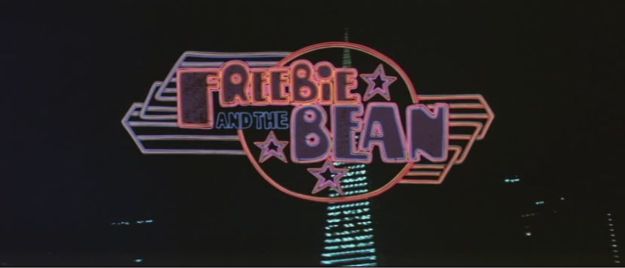
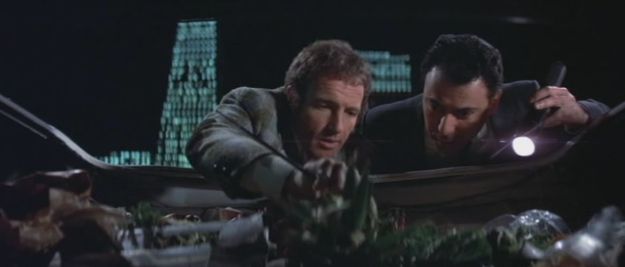
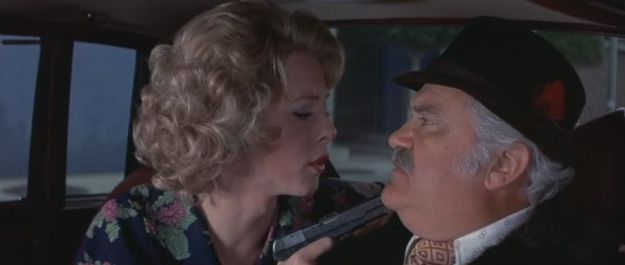
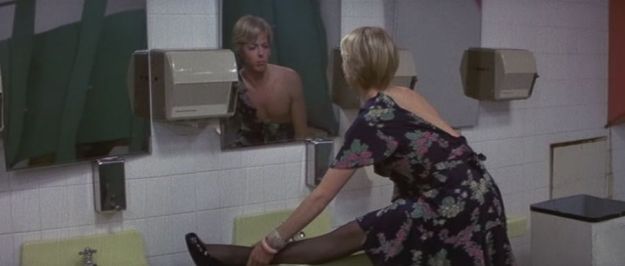
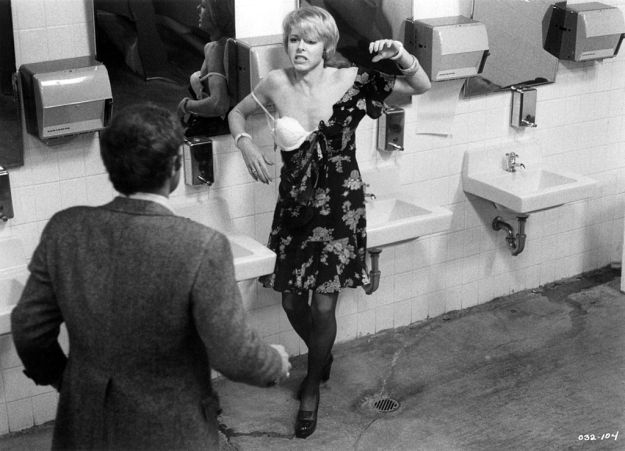
THANK YOU! You win the blogathon this year. I tried to write about Freebie and the Bean some years ago but got so angry with it that I almost pitched my television across the room.
I didn’t know anything about the film, really, other than a few vague memories of when it was on network TV when I was a kid. I’d heard the generic “it’s funny” and “lots of action” comments, loved Alan Arkin, so bought this from the WB Archive. Then my husband and I watched it and I about flipped — despite watching The Celluloid Closet twice, I didn’t remember the infamous shooting in the bathroom scene was from Freebie. We were both SERIOUSLY angry at the film by the end.
I don’t remember people cheering at that scene, but then again I don’t remember much about the film. I thought it kind of stupid at time. It would be interesting to see again now that I am not a young teenager. Busting and even The Super Cops (both similar, and from the same year, I think) were better. But Busting has the same issues you blog about.
1974 is one of my favorite movie years, but not for any of these.
There are a LOT of cop films like this in the 70s. Here’s one I reviewed in ramp-f 5 years ago: http://goo.gl/kbq0V
No one loves 70s cinema more than me, but I have no problem taking out the trash.
PS: I don’t think you meant Hal Ashby. It’s Hal Erickson.
You’re right, I’ll correct it. Was reading a post on Indiewire that mentioned Ashby and Freebie at the time and got the names confused.
IIRC, the interview in Celluloid Closet where people said there was cheering at the end was someone who witnessed it first-hand. Since I’ve experienced theatrical cheering at the demise of the bad guy in a few films, I don’t doubt it, personally.
Lots of reviewers at the time thought the film was silly. I seem to recall the NY Times review was particularly dismissive.
I remember seeing Freebie and the Bean as a youngster (probably on the ABC Sunday Night Movie back in the day)…and the only thing I enjoyed about it was the car chases–which as you point out, aren’t all that and a bag of chips anyway. The funniest thing in the movie–for me, anyway–is when James Caan looks at Alan Arkin after their car has completed an impossible stunt and says “Ta-dahh!!!” (I’m still using that to this very day.)
But you and I are in agreement about why so many people seem to love this movie despite its blatantly homophobic content and sniggering, juvenile, almost puerile-at-times humor. Every time I read a glowing review from one of its defenders two questions come to mind. 1) What have they been smoking? 2) Why aren’t they sharing the wealth?
If the film had been intentionally puerile, I would have given it more of a pass; the problem, I think, is that everything it engaged in was not considered necessarily in poor taste in 1974. Like in Duel at Diablo, which goes out of its way to push race and gender stereotypes aside, they still manage to use a Jewish actor in redface as a Native American, simply because in the late 1960s that wasn’t seen as necessarily wrong and it was easy to “overlook” even when trying not to. The same goes for Freebie IMHO, where it seems the characterization of Bean’s Wife is supposed to be irreverent and a stereotyped Latina on purpose, but no one thought twice about using a white actress in brownface.
And what was with the editing on the car chases? When they find that Plymouth Fury with the stolen plates, the sequence of “disguising” themselves as non-cops with the baby shoes on the rear view was interminable. Did an editor even look at that scene? Then as they follow the Fury, the stunt car is off its mark so swerves a good 3 feet toward a car’s open door to make sure it hits it, and even though the only camera used for the stunt caught that correction so blatantly, they still used the shot. Couldn’t have had another camera filming? Couldn’t have dropped $200 on a backup beater for mistakes like this? Couldn’t have edited it a little? Sheesh.
Pingback: 2012 QUEER FILM BLOGATHON « Garbo Laughs
Pingback: Queer Film Blogathon: Day 5 | Pussy Goes Grrr
Slow clap. This article is amazing. I love how you didn’t just say, “well, some people think this;” you looked for examples of people who think “this” and linked to them. You have changed the way I as a film reviewer need to look at classic films, because I think I have been guilty of “that’s the way it was back then.”
That’s a heck of a compliment. Thank you so much!
Great review, Stacia — not only of the film, but of the social anxiety that inspires unreconstructed Bros to embrace this movie and and its ilk, not as entertainment, but as a giant middle finger to a culture that no longer finds their junior high locker room fag-bashing quite so funny.
Also, if you don’t mind, FatB is now my hip hop name.
Thanks Scott!
I don’t know why people need that kind of attitude validated. The recent dust-up about the rainbow pro-Pride Oreos on Facebook just makes me shake my head. Who has so much hate that they need to boycott a cookie to make themselves feel better? Same people who need to watch FatB and say “Screw you, PC assholes!” afterward, I guess.
My fingers would get so tangled typing “FatB” until I realized it was Fat B, then suddenly my brain clicked and my fingers aligned and all was right with the world.
Good analysis. I remember seeing this film in the theater when it was new and only recall being disturbed by the degree of graphic bloodshed in what was supposed to be a farce. For me, that was the stuff memorable for not being funny. The rest of the film went into the circular memory file. I probably should have been shocked enough by the rest to remember it.
Your review got me thinking about an episode of BARNEY MILLER from probably that same year, which I just watched again recently with some other early episodes of the show. A cross-dressing man is brought in, and his offense is “dressing in disguise,” against which there is apparently a city ordinance. It’s occasion for the kind of 1970s humor you would expect, but the guy is never made a fool of in the way the show could so broadly stereotype other characters for laughs, like Linda Lavin’s role in another episode as a female cop. Or (and this was OTT), the bunch of prostitutes who appear in yet another one, called nudge-nudge “Courtesans.”
Hi Ron!
I remember that episode! I watched Barney Miller religiously as a kid. My parents weren’t really into the whole parenthood thing, which meant I developed a moral compass from television shows. I credit Barney Miller and Sesame Street for making me the crazed UberLiberal I am today.
Came upon this page while searching for information on Christopher Morley. I just finished watching the Magnum P.I. episode with him in it as an international assassin called The Jororo Kill. Even though Christopher Morley did crossdress (and gorgeously) in the episode like he did in the above review for the FatB film, the way they used it as story fodder was actually quite respectful. There is a point where Magnum says “and he even dresses up as a woman” a little surprised, and Higgins specifically replies with admiration.
Anyways, I just wanted to mention I quite appreciated your review and writing. I’ll not ever be seeing the film intentionally, but I really enjoyed your writing style.
Thanks cool! I appreciate the kind words!
I have been thinking off and on about that Magnum PI episode ever since I wrote this entry and saw it on Morley’s IMDb page. I am reasonably sure I saw it back in the day, yet just can’t be certain. It’s nice to hear that they were respectful of Morley, unlike Freebie and the Bean.
Well I’m always happy to be quoted about FREEBIE & THE BEAN and your essay doesn’t stray much from my own take on the film but you’ve rather unfairly taken half a sentence to transpose that I’m “fuck all this PC shit!” that the film engenders from some circles. You could have quoted this line from my review as well:
“But FREEBIE & THE BEAN is still disturbing after all these years. Amid some of the greatest car chases in American film history, our heroes are crude, bigoted and oblivious to their swath of destruction. The film is particularly homophobic, or the attitude is, with lots of “fag” putdowns and the major bad guy is a transvestite. ”
And pointing out that tough guy Caan gets his ass beat down by a man in women’s clothes is an offset to his machismo, something that seems pretty obvious. Richard Rush told me the film was a response to DIRTY HARRY and his “heroes” are intentionally brutish. And I’m okay for people not liking the film for its casual homophobia but there’s a little more here than meets the eye.
Hi Christian – sorry I didn’t see your comment earlier, I don’t get email notifications sometimes and this slipped right past me.
For future reference for anyone who comes along at a later date, your review that you said I unfairly used is here:
http://www.christiandivine.com/ohmyblog.html/286
Your accusation that I misrepresented you is disingenuous. You provided a quote, but it’s hardly indicative of anything. It’s just one of two brief acknowledgements you made about the problems in the film. Both those acknowledgements, by the way, are made deliberately secondary by you following them with “but.” You say Freebie is homophobic but it’s “offset” because the “transvestite” beats him up. You also say the film was disturbing but Arkin & Caan are perfect as the bickering couple. Given your overall tone in the article, I don’t think that was accidental. It sounds very much like the exact thing I was talking about in my post: the shoulder-shrugging who-cares attitude that makes it easy to at first ignore, then embrace, bigotry.
By the way, “pointing out that tough guy Caan gets his ass beat down by a man in women’s clothes is an offset to his machismo” is indeed obvious — so obvious that I mention that in my article. Saying a “man in women’s clothes” is not quite a man IS THE WHOLE FREAKIN’ PROBLEM HERE.
Pingback: ‘Kate Bornstein Is a Queer and Pleasant Danger’: A Portrait With Missing Pieces | Bitch Flicks